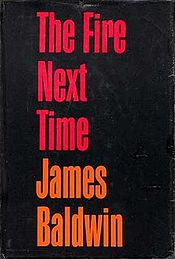- The Fire Next Time
-
The Fire Next Time
First edition coverAuthor(s) James Baldwin Country United States Language English Genre(s) Essays Publisher Dial Press Publication date 1963 Pages 128 The Fire Next Time is a book by James Baldwin. It contains two essays: "My Dungeon Shook — Letter to my Nephew on the One Hundredth Anniversary of Emancipation," and "Down At The Cross — Letter from a Region of My Mind." The first essay, written in the form of a letter to Baldwin's 14-year-old nephew, discusses the central role of race in American history. The second essay deals with the relations between race and religion, focusing in particular on Baldwin's experiences with the Christian church as a youth, as well as the Islamic ideas of others in Harlem.
The book was first published by The New Yorker and owing to its great success, it was subsequently published in book form by Dial Press in 1963, and in Britain by Penguin Books in 1964; both essays in the book had previously been published in The Progressive and The New Yorker, respectively. Critics greeted the book enthusiastically; it is considered one of the most influential books about race relations in the 1960s.
Contents
Origin of Title
The title comes from the old Negro spiritual "Mary Don't You Weep" and the line, "God gave Noah the rainbow sign, no more water the fire next time."[1]
Important Quotations
1. “A vast amount of the Negro problem is the white man’s profound desire not to be judged by those who are not white, not to be seen as he is” (95).
2. We are controlled by our confusion, far more than we know, and the American dream has therefore become something much more closely resembling a nightmare, on the private, domestic, and international levels. Privately, we cannot stand our lives and dare not examine them; domestically, we take no responsibility for (and no pride in) what goes on in our country; and, internationally for many millions of people, we are an unmitigated disaster. (89)
3. Perhaps, people being the conundrums that they are, and having so little desire to shoulder the burden of their lives, this is what will always happen. But at the bottom of my heart I do not believe this. I think that people can be better than that, and I know that people can be better than they are. (90-91)
4. How can one respect, let alone adopt, the values of a people who do not, on any level whatever, live the way they say they do, or the way they say they should? I cannot accept the proposition that the four-hundred-year travail of the American Negro should result merely in his attainment of the present level of the American civilization. (96)
5. At the center of this dreadful storm, this vast confusion, stand the black people of this nation, who must now share the fate of a nation that has never accepted them, to which they were brought in chains. Well, if this is so, one has no choice but to do all in one’s power to change that fate, and at no matter what risk—eviction, imprisonment, torture, death. (104)
6. “The Negroes of this country may never be able to rise to power, but they are very well placed indeed to precipitate chaos and ring down the curtain on the American dream” (88).
7. I know that what I'm asking is impossible. But in our time, as in every time, the impossible is least that one can demand—and one is, after all, emboldened by the spectacle of human history in general, and American Negro history in particular, for it testifies to nothing less than the perpetual achievement of the impossible. (104)
Bibliography
1. Baldwin, James. The Fire Next Time. New York: Vintage, 1993. Print.
See also
References
- ^ Marsh, Dave. "Dave Marsh's Notes for Bruce Springsteen's "We Shall Overcome: The Seeger Sessions"". Brucespringsteen.net. http://www.brucespringsteen.net/Seeger_Marsh_notes.pdf. Retrieved August 5, 2009.
Works by James Baldwin Novels Plays Short story collections Poetry collection Jimmy's BluesEssay collections Notes of a Native Son · The Fire Next Time · No Name in the Street · The Devil Finds Work · The Evidence of Things Not Seen · The Price of the TicketCollaborations Nothing personal · A Rap on Race · One day when I was lost · A Dialogue · Little Man Little Man: A Story of ChildhoodCategories:- 1963 books
- Essay collections by James Baldwin
Wikimedia Foundation. 2010.

